Helen Hunt, 60, Stuns During Her Latest Appearance, and Her Lips Become the Center of Attention

There are countless doors all over the world that haven’t been opened for decades and even centuries. The question is why? It seems that nowadays you can open any door you want.
The truth is that some doors were sealed for a grave reason. And so far, nobody has found out what treasures and mysteries they hide. Here are 4 doors that keep their secrets all too well.
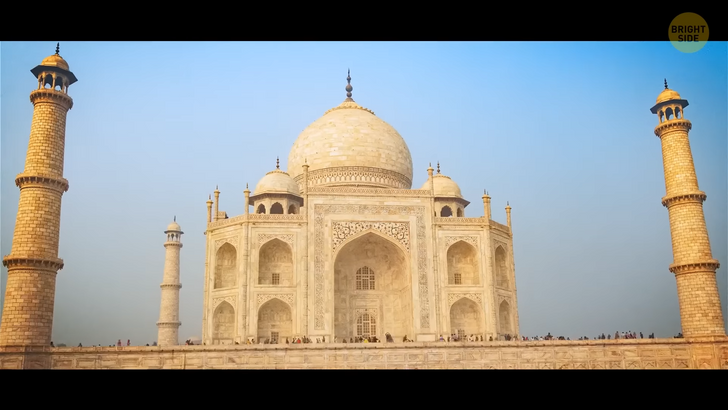
The Taj Mahal. First up, we’ve got the Taj Mahal in India, one of the most romantic places in the world. Shah Jahan commissioned it in 1631 and dedicated it to his third wife who he loved like crazy. They were married for 19 years and had a whopping 14 kids together! But, unfortunately, she passed away while giving birth to their last baby.
Shah Jahan was heartbroken and decided to build an epic tomb to remember her by. The construction took a whopping 20 years to finish. The building has quite an interesting layout. The design is super unusual with these four massive 130-ft tall minarets that stand on the corners of a huge platform. They’re not just there for looks.
Back in the 17th century, architects were having some serious issues with buildings collapsing under their own weight. So, the chief architect of the Taj Mahal made sure to place those minarets as far away from the tomb as possible. And he even tilted them in a way so that if they did fall, they wouldn’t wreck the rest of the Taj Mahal. Talk about planning ahead!
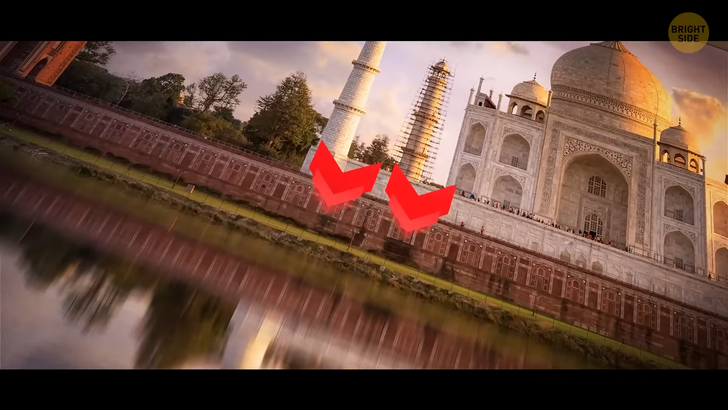
The Taj Mahal is hiding some crazy secrets. There are sealed rooms all over the place that nobody is allowed to enter. And if you check out photos of the building from the riverside, you can spot two basements. But guess what? They’re sealed up too! Nobody knows what’s inside or why they’ve been locked up since the time of Shah Jahan.
Apparently, there’s a good reason why those rooms are off-limits. Some researchers think that they were built using marble, which turns into a different substance called calcium carbonate if it’s exposed to carbon dioxide. And when that happens, little bits of marble start chipping off like crazy. To make matters worse, there’s no air flowing into these rooms. That means that if too much CO2 builds up in the basement, the 4 minarets could collapse!
But wait, there’s more! Some people think that the body of Shah Jahan’s wife can be found in one of these sealed-up rooms, in pristine condition. Why not? Who knows what the mysterious rooms might keep.
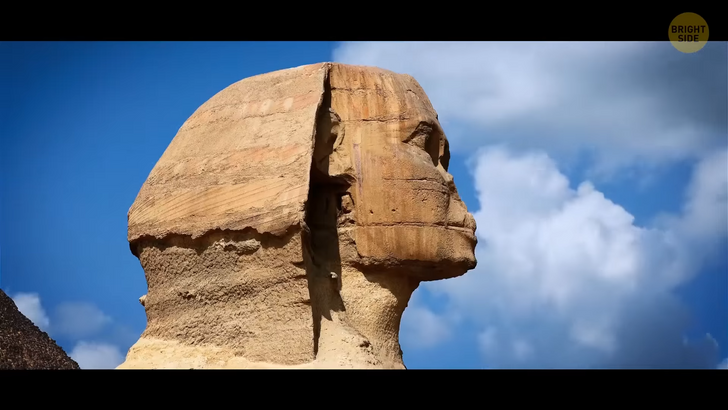
The Great Sphinx of Giza. The Great Sphinx of Giza is shrouded in mystery. It’s not just the largest monolith statue in the world, but it’s also a hybrid creature with a woman’s head and a lion’s body that originates from Egyptian and Greek mythology. It’s also very ancient: it’s estimated to be around 4,500 years old.
The construction of this marvel took about 3 years and required 100 workers, who were not slaves and were treated with delicacies like sheep and goat meat. It is also thought that it used to be much more massive than it is now. Archeologists found huge stone blocks and abandoned toolkits near the site. However, the real secrets of the Sphinx lie underground, near its paws.
A group of scientists used a seismograph to detect two hidden chambers beneath the Sphinx’s paws. Some people think that these rooms might be the legendary “Hall of Records,” which holds ancient scrolls revealing the secrets of the universe. I mean, that’s way cooler than any library I’ve ever been to. Rumor has it that the Egyptians even had info on Atlantis stashed down there, which is like a super old version of a conspiracy theory.
Unfortunately, we can’t go on an adventure to check it out just yet. The chambers presumably have 2 entrances, but both remain sealed. The researchers haven’t yet received the green light to check out their theory. Let’s hope they won’t keep us in suspense forever!
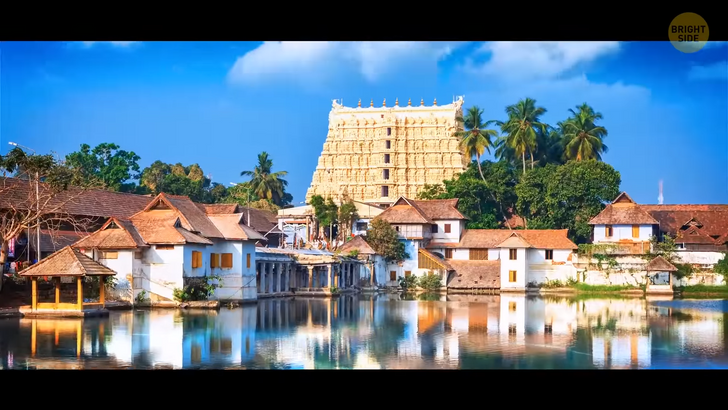
Sree Padmana-bha-swamy Temple. This temple is located in the beautiful state of Kerala in India. This temple is famous for more than just its breathtaking beauty. Underneath the temple, there are 6 vaults, creatively named A, B, C, D, E, and F. The enormous iron doors to these chambers add to the mystery of what’s behind them. A few years back, the authorities decided to open these vaults to the world, but it wasn’t an easy task.
You can’t just open the doors and enter the vaults: it required a lot of work. It took them a while, but finally, in 2011, they opened five of the six chambers. And guess what they found? Tons of treasure! Bags of gold, precious gemstones, and priceless diamond jewelry. The estimated worth of everything found in the vaults is a whopping $1 trillion! It’s like the temple was the real-life inspiration for Aladdin’s Cave of Wonders.
But wait, I said five of the six. What happened to the last one? Vault B has remained closed, but not for lack of trying. They simply didn’t manage to open it. There is even a belief that it’s fatally cursed! Legend says that only a saint or sage can break the curse by chanting a specific mantra. But no one has been able to do this yet, presumably because we don’t have saints or sages at our disposal.
There is also a rumor, that in the 30s some temple invaders tried to enter Vault B to do some good old looting. But they never reached their target. Apparently, terrible snakes materialized out of nowhere and chased the gang away. But of course, this is just an urban legend, and there is no proof of that. However, it is said that the Auditor General dealing with the temple claimed that Vault B had been opened at least seven times since 1990, and nothing bad happened to anyone who entered. Who knows? Maybe we should send Indiana Jones to check it out!
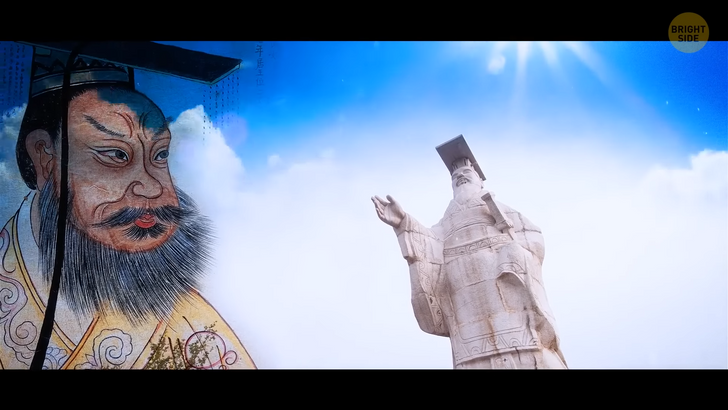
The First Emperor’s Tomb. Deep under a hill, completely undisturbed and surrounded by dangerous traps, lies an ancient 2000-year-old tomb. It belongs to Qin Shi Huang, aka the First Emperor of China. He was born in the Qin state and became king when he was just a boy.
But when he grew up and gained full power, he united the warring states ancient China was divided into by conquering them. After that he created the Qin Dynasty. When he died in 210 BCE, they buried him deep underground in a massive tomb. And when I say massive, I mean MASSIVE!
Back in 1974, some farmers in Xi’an, China, stumbled upon something strange while digging a well — a huge terracotta soldier. This discovery led to an extensive archaeological dig that has continued for over 40 years, revealing a collection of thousands of clay soldiers. The unique thing about these soldiers is that each one has its own unique features, from hairstyles to facial expressions. It’s believed that there could be up to 8,000 of these soldiers, but only 2,000 have been found so far.
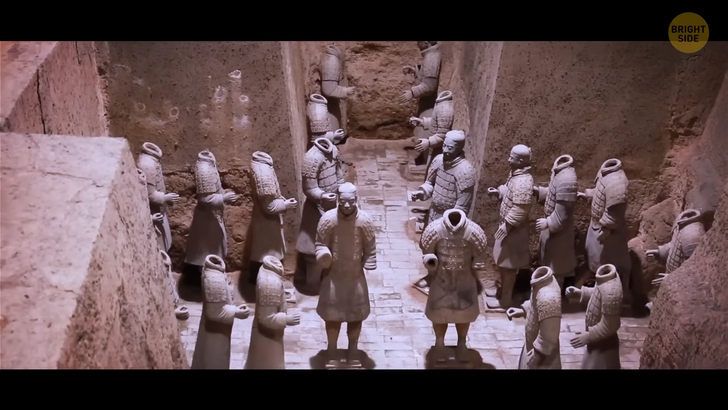
Interestingly, the central tomb, which is believed to be the resting place of the emperor, is still untouched. In ancient records, there are references to a vast underground city that the emperor built, complete with scenic towers, palaces, and whatnot. Sima Qian, a Han dynasty historian, wrote that the tomb was adorned with treasures and had space for hundreds of officials. But the lack of technology to properly examine the site is what’s holding things up.
Qin Shi Huang was surrounded by liquid mercury in his tomb, with two of the streams representing the major rivers of China: Yellow River and Yangtze. The ancient Chinese believed that mercury could provide immortality, but it could have also caused the emperor’s death since he regularly took mercury pills to prolong his life.
The dangerous levels of mercury contamination in the soil near the tomb are the main reason why scientists are reluctant to explore it. It could be very dangerous both for people and for the environment! Now, if I had to choose which door to open, I’d probably go for the one that doesn’t lead to a tomb surrounded by poisonous mercury. Call me crazy, but I’d like to avoid any potential health hazards!











